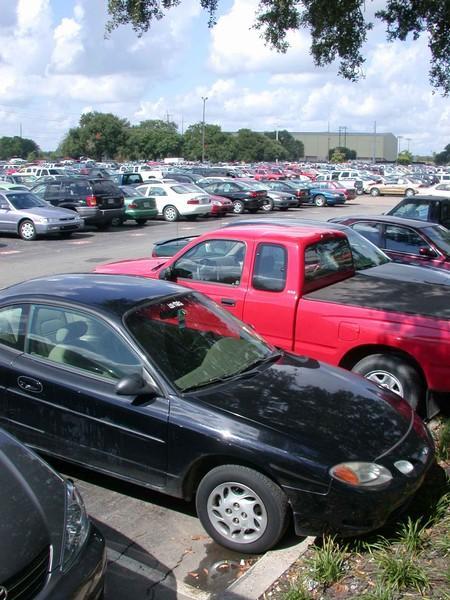Despite many complaints from students about the parking situation on campus, only two students showed up to an open meeting with the Chancellor’s Parking Task Force Wednesday in the Union.
The four task force members and two students discussed a number of ideas on how to improve the University’s parking and traffic situation, all of which the committee said they would consider.
Sarah Joy Hays, a communications studies senior and director of campus affairs for Student Government, said 15 to 20 students, including Student Government President Brad Golson and Vice-President Jenny Byrd, sent her an R.S.V.P. for the meeting. Neither Golson nor Byrd were present.
Byrd said she and Golson were in a meeting with Mayor-President-elect Kip Holden and were unable to attend.
Byrd also said the low student turnout was disturbing, but she hopes students are taking advantage of the survey sent Monday to faculty, staff and students via broadcast e-mail.
Gary Graham, director of Parking, Traffic and Transportation, said the University had 8,000 responses as of late Wednesday afternoon with 4,400 of the responses generated in the first 24 hours of the survey.
Hays said the data gathered from the survey will be turned over to the University’s Public Policy Research Center. Hays said the center will generate a data report for the University’s parking consultant, Chicago-based Walker Parking Consultants.
After then-Chancellor Mark Emmert appointed nine people to his parking task force, they solicited the services of Walker at a cost of $85,000 to review the logistics and develop a comprehensive plan for a parking system on campus.
Jason Soileau, assistant director of the Office of Facility Development and task force member, said Walker was chosen because of its reputation as a nationally recognized parking firm.
Committee members said they expect an initial report from Walker at the end of December or January, with the final report expected in February.
The University already has restrictions in place to restrict traffic in the campus’s interior, but the restrictions are not enforced.
Currently, student vehicles are not allowed to travel down most of the streets on campus such as Fieldhouse Drive in front of Lockett Hall.
Soileau said the restrictions will be enforced in the future to aid congestion problems on interior streets.
The existing plan is designed to restrict student travel to major streets around the perimeter of campus such as Dalrymple Drive, Aster Street, Highland Road and Nicholson Drive and the Nicholson Extension.
Graham said enforcing the existing rules would be difficult, most likely involving traffic officers or gated streets.
Part of the University’s Master Plan involves moving parking to the perimeter of campus with shuttle service to and from the parking lots.
Soileau said one idea in the works involves the construction of substations in parking lots where students could buy coffee or access the Internet.
Soileau said for the system to work, shuttles would have to run every two to five minutes.
The committee said implementing the Master Plan would inevitably involve reducing the number of parking spaces on campus, but Graham said about 2,000 spaces routinely go unused, mostly in lots around the perimeter of campus.
Graham said that while the Master Plan outlines goals for the campus, which include parking, it is not very detailed.
“The Master Plan gave us broad stokes,” Graham said. “We’re trying to fill in the gaps.”
Graduate student Michael Ohene, one of the two students present for Wednesday’s meeting, said students at schools comparable to LSU pay much higher fees for parking and suggested the price per permit could be raised to $77 a year to to better fund mass transit and decrease campus traffic flow.
Hays said students are used to paying very little, $39 yearly, for parking. Hays and Soileau agreed that was something students have grown accustomed to.
Ohene said the University of Georgia recently raised its parking fees and reduced the number of spaces on campus, essentially guaranteeing each permit holder a parking space.
Graham said about 80 percent of the students on campus have parking permits and said the task force is exploring options to reduce that number while making the system as a whole more effective.
One option being discussed is a tiered system, with students paying more to park in lots closer the the campus’s interior.
The Chancellor’s Parking Task Force will hold another public forum Nov. 30 from 3 p.m. to 5 p.m. in 102 Allen Hall to further discuss campus parking and transportation issues.
Low student turnout at Parking Task Force forum
November 18, 2004

Low student turnout at Parking Task Force forum



